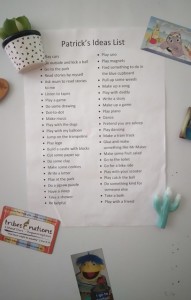The curse (or is it opportunity?) of ‘I’m bored!’
It’s holiday time, or perhaps just the weekend. The kids are home. Structure is out the window and free time is on the menu is lovely large doses.
What a blessing!
Or, perhaps not. Perhaps at your place free time brings her nagging cousin: ‘I’m bored!’
But have you ever stopped to consider what is really behind the ‘I’m bored’ statement? Sometimes it is really a statement of dissatisfaction. My brother told me of a time he was 4WDing with his family and his son was complaining of boredom along a particular stretch of road. On the return trip my brother realised the view from his son’s window at the time of the complaint was that of a very steep cliff drop. ‘I’m bored’? or ‘I’m possibly terrified but am not sure how to articulate it!’?
My own 5-year-old often uses ‘I’m bored’ as a complaint when he feels frustrated and wants to change the situation he’s in. Frequently this occurs when there is some conflict between his peers he feels unable to amend.
But many times, ‘I’m bored’ simply means ‘I don’t know what to do next and I’d like you to figure out what I could do’. This can be particularly frustrating, especially when put on the spot. But one strategy is to pre-empt the complaint.
Making an Ideas List
Before the ‘I’m bored‘ arrives – or when the first one comes – take the opportunity to create an individualised ‘Ideas List’ with your child. Brainstorm together ideas of things to do that can be used next time the child is at a loss for what to do with their time.
Here are some suggestions to get you started:
- Think of things you already know the child enjoys
- include creativity tasks: making, building, designing things
- consider activities that help or encourage others, eg. making a card or picking a flower arrangement for a neighbour
- brainstorm ideas for independent time, as well as ideas that can be done with others
- list some activities that include one on one time, eg. shared story reading
- think of a few ideas that result in food (and eating, and sharing!)
- include activities that help with the child’s development, eg. specific games to improve fine motor skills
- and don’t forget to include some helpful tasks for around the house!
Try to come up with as many ideas as possible and enjoy the list making process! If you have more than one child with the tendency to complain in this manner, you could make individualised lists for each one.
Make sure you display your new ‘Ideas List’ in a prominent position – ours is up on the front of the fridge! And the next time you are greeted by a glum faced child complaining of boredom, you’ll be ready to reply like this:
“Really? How exciting! That means you have a chance to do something new! Let’s go look at your ideas list…’

Comments
The curse (or is it opportunity?) of ‘I’m bored!’ — No Comments
HTML tags allowed in your comment: <a href="" title=""> <abbr title=""> <acronym title=""> <b> <blockquote cite=""> <cite> <code> <del datetime=""> <em> <i> <q cite=""> <s> <strike> <strong>